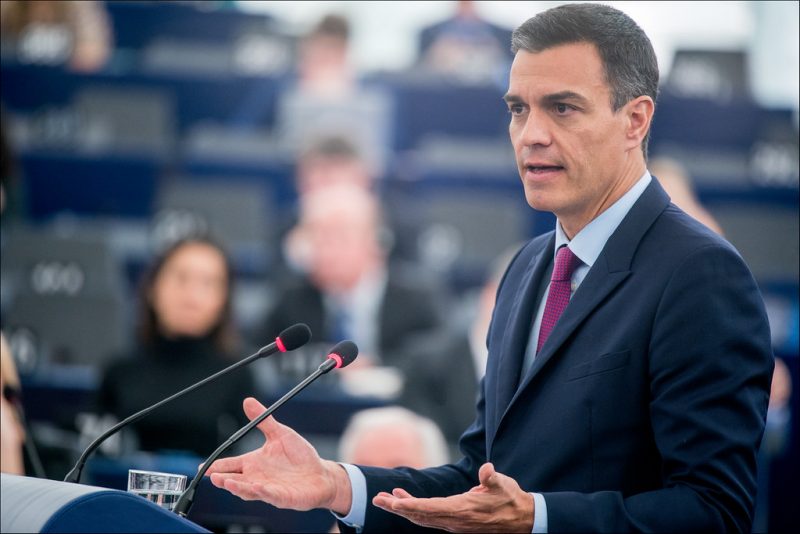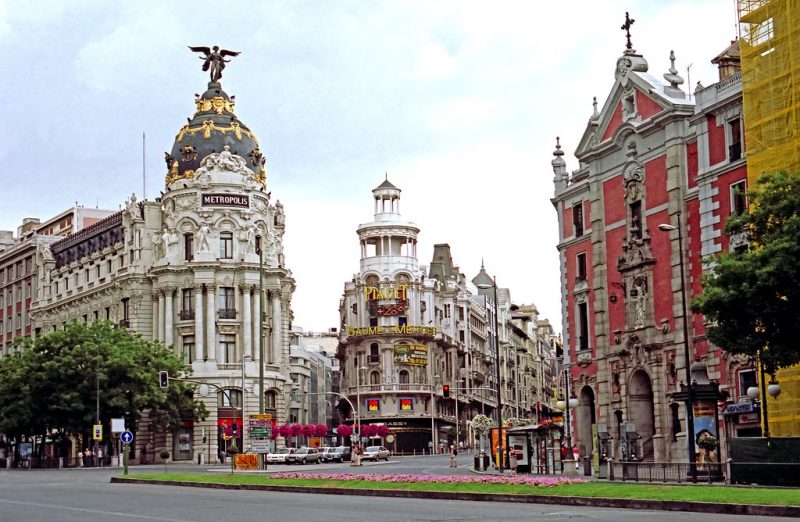Context
On November 10, 2019, early elections to the Spanish ‘Cortes Generales’ (Parliament) were held in Spain, but no party won an absolute majority of seats in Congress needed to form a government. Moreover, even possible coalitions between the five major parties do not have an absolute majority and all need the votes of minority regional or nationalist (separatist) parties.
To learn more about the post-electoral context, read our article: “Spain: endless general elections?”
A “left-wing” pact
Since the aforementioned elections, the initiative to gather the necessary parliamentary support to appoint the new president of the Spanish government has fallen on Pedro Sánchez (of the ‘Socialist Party’ – PSOE), who has been acting president since June 2018. Sanchez’s main partner is Pablo Iglesias (of the ‘United We Can’ – UP), who has demanded positions in the government such as vice-presidencies and ministries. The Socialist Party initially rejected the idea that the new government would be a coalition and instead spoke of a “government of cooperation,” i.e. the UP should support the PSOE in forming a new government, but without being part of it. For the UP, this was unacceptable, and, in fact, because of this impasse in negotiations and the lack of an alternative majority, in November 2019, the elections were repeated.
However, in light of the election results in which both PP and VOX increased their seats, shortly after the elections, Sanchez (PSOE) and Iglesias (UP) signed an initial agreement that has been the basis for negotiations between the two left-wing parties. Here, the negotiations can be divided into two parts: power and propaganda. Although both parties claim to show that the negotiations are based on “social ideas of the left,” the reality of politics is always more raw and direct: the only “idea of the left” in these two formations has been to achieve or maintain their party hegemony. In short, the important result is the distribution of power in government positions. The PSOE has tried to give the minimum and least relevant positions to UP, and the UP has tried to get the maximum possible and most relevant positions in the Government.
On the other hand, there is the question of the territorial debate within Spain, as well as its fit within the European Union, and Sanchez’s position is clear. He pointed out in the investiture debate held on 4th January 2020: “A decentralised and federal Spain in a federal and united Europe,” which translates into a weaker Spain within a European Union with more powers over its Member States. Furthermore, the leaders of the UP, such as its top leader, Pablo Iglesias, are also visibly in favour of “plurinationality” in Spain, following the scheme of Evo Morales in Bolivia. Thus, the territorial debate within Spain has much more partisan complexity as we will now see.
Likewise, Sánchez has been playing the “tension” card, just like his socialist predecessor in the Spanish Presidency, José Luis Rodríguez Zapatero (2004-2011). Sánchez has claimed that the tensions in Congress produce divisions in the street, and that this is not patriotic. This means that, once again, the left sees it as legitimate to protest against politicians, but not against them. When they are in power, the patriotic thing to do is to keep quiet.

Flickr
The keystone of Catalan (and Basque) separatism
In order to obtain an absolute majority in the inaugural session and above all to guarantee himself governance during the 4 years of the legislature, Sanchez needs the support of regionalist or nationalist (separatist) parties. In particular, they have focused on negotiations with Esquerra Republicana (ERC), a separatist and left-wing party in Catalonia, as its 13 seats are sufficient to guarantee such an absolute majority. The problem for Sanchez is that several of the ERC leaders are in prison for different crimes (again, see the article mentioned in footnote 1), including sedition and embezzlement.
The turning point in the negotiations came in mid-December 2019 when the Court of Justice of the European Union (CJEU) issued a ruling regarding several Catalan separatist leaders in prison (Junqueras – ERC) or ‘on the run’ from justice (Puigdemont – JxC). The debate that was intended to resolve the sentence is the exact moment when an elected candidate is considered to have acquired the status of ‘Member of Euro-Parliament’ and therefore already enjoys the immunity that comes with membership. In this sense, the one who most benefited was the former president of the Catalan autonomous community, Carles Puigdemont, who escaped from Spanish justice in 2017 and is now an MEP in Brussels after the sentence. On the contrary, the situation of Junqueras does not change since the sentence also indicates that immunity implies leaving prison to carry out the formalities required in the European Parliament; this does not imply the lifting of preventive detention, much less once there is a final prison sentence (to which we can add political disqualification).
Of course, for ERC the sentence is a triumph of its postulates and a clear signal that all the politicians imprisoned in sentence 459/2019 (published on October 14) must be released. Here there appears another division within the PSOE, as some regional representatives reject any pact with ERC, while other representatives want to get that support from the Catalan separatists to form a tripartite government. There is even a division within some state institutions, since while the Public Prosecutor’s Office of the Supreme Court is opposed to the release of Junqueras, the State Attorney’s Office has asked for his release so that Junqueras can serve as a MEP. There is also a dispute over the hegemony within Catalan separatism between ERC and JxC, since now the most voted party is the ERC, while previously it had been JxC and above all its party predecessor, Convergencia i Unió (CiU) [Convergence and Union].
In addition to the above, this issue of nationalists (separatists) also includes the territorial debate, that is, the conditions that ERC or the PNV (Basque Nationalist Party) set by Sánchez in exchange for his support in Congress. In fact, it is the same situation that has been systematically repeated over the last 40 years when there was no single-party government with an absolute majority. And now the PSOE is in a moment of special electoral weakness and these parties are trying to maximize their economic benefits, which in this case speak directly of a territorial reconfiguration of Spain, so that regions like Catalonia or the Basque Country become statelets and in the end can even be independent if they decide to do so by referendum.
Finally, after several months of negotiation, the PSOE and ERC reached an agreement whereby ERC will abstain from voting on the appointment of Pedro Sánchez as President of the Government. The agreement between the two parties refers to two points, the political path to resolve “the political conflict” in Catalonia and the creation of a bilateral table to negotiate and resolve this “conflict.” However, a deputy from ERC indicated directly to Sánchez in Congress that ERC does not care at all about the governability of Spain, since they are only there to fulfill their objectives, starting with the release of the separatist politicians imprisoned for sedition.

Flickr
On the side of the Basque nationalist (separatist) parties, we have the historic right-wing liberal Basque Nationalist Party (PNV) ready to reap as many benefits as it can from the weakness of the central government. In fact, they have supported Sánchez in the investiture because he has promised new concessions from the central government to the Basque Autonomous Community. The radical left formation BILDU made the same demands as the other Catalan separatist parties, but abstained from the vote. There has been a lot of controversy with this party because they come from the political branch of the terrorist group ETA, and consequently many other parties, especially from the right-wing block, consider them to be spokespersons for the terrorists– and now Sanchez has also sought their support in the form of abstention. Likewise, the declarations against the King, the Constitution and the Spanish Armed Forces issued by BILDU deputies in Congress have also increased the tension with other constitutionalist parties.
The “right-wing” opposition and the head of State (King)
On the right-wing side, Partido Popular (PP) and VOX are the majority parties, but each has campaigned on its own since the PP does not want to mix with VOX, as VOX has been described by other big parties and mainstream media as “far-right.” However, the PP needs VOX for any alternative pact just as it has needed it in other regional parliaments or city halls. The position of PP leader Pablo Casado has been one of absence and inactivity in recent months, which may indicate that he expects the derailment of the PSOE-UP coalition, and the exhaustion of VOX, in order to return to being the first “center-right” political party in Spain and perhaps gain again an absolute majority or a sufficient majority to avoid having to resort to complex coalition pacts. Meanwhile, VOX has taken a more belligerent role against the PSOE-UP pacts with the separatist parties as they are against any pact that serves to break Spain (but always from a “neocon” point of view).
In all of this belligerence, they have even taken advantage of the international circumstances that have led them to Bolivia, where several deputies recently travelled to meet with the Ministers of the Interior and Defence. Let’s remember that at the end of 2019 a coup d’état or national mutiny due to fraud in the presidential elections (depending on how you look at it), ended with the flight to Mexico (and later to Argentina) of until then president Evo Morales. The incident that motivated VOX deputies’ trip was when, in the last days of December, the news appeared that four Spanish police officers of the Special Operations Group (GEO) had participated in an incident in the Mexican embassy of La Paz (Bolivia). In that incident, the armed and masked Spanish officers allegedly tried to gain access to the Mexican embassy in order to extract a number of refugees there who were being held by the Bolivian police. Nine high-ranking officials from the Morales period are taking refuge in the Mexican embassy as asylum-seekers, all of whom are described by the current Bolivian Government as “known criminals” and are accused of sedition, terrorism and drug trafficking. Even the current Bolivian government accuses the Spanish acting president, Pedro Sánchez, of “trampling on Bolivian sovereignty.”
In addition to the accusation against Sánchez, the controversy extends to the UP because of the historic relationship of its leaders with former President Morales (as well as with Venezuelan Chavism), in particular the possible relationship and benefit (illegal financing) between those now living in asylum in the Mexican embassy in Bolivia and UP members such as the deputies in the Spanish parliament, Pablo Iglesias and Íñigo Errejón, as well as the PSOE, such as former judge Baltasar Garzón and former Spanish President, José Luis Rodríguez Zapatero. The Bolivian government minister, Arturo Murillo, has even requested that the Attorney General summon the aforementioned to testify “to the alleged illegal financing received through embezzlement of Bolivian money during the government of Evo Morales.”
Finally, the relationship between the head of State, King Philip VI and Pedro Sanchez is distant, as Sanchez’s coalition would bring together numerous republican and anti-military elements. The monarch’s position has been to move away from the media spotlight, to let the controversies affect other politicians while the Crown fulfils its constitutional functions. However, several direct or indirect partners of the PSOE such as UP and ERC, in addition to Republicans, also systematically attack the Spanish Armed Forces, and the Head of State (in addition, the King is also a Captain General). In fact, during the Military Easter celebrated last January 6th, King Felipe VI expressed in his speech the commitment of the Armed Forces and the Civil Guard with Spain and its Constitution. The King also reaffirmed Spain’s commitment to NATO.
Morocco, the problem of the south
During December, Spain’s perpetually uncomfortable southern neighbour also entered the scene, taking advantage of any weakness in Spanish politics to advance its expansion projects. In this case, the Moroccan Minister of Foreign Affairs, while insisting on Morocco’s “sovereign right” to delimit its territorial waters, left an open space for dialogue with Spain.

Pixabay
The projects approved in Morocco aim at the annexation of the territorial waters of Western Sahara as well as its expansion to the territorial waters of the Canary archipelago (Spain). In this Canarian maritime subsoil, mountains have been found with important deposits of tellurium or cobalt, which are essential for new technologies. This matter has passed superficially in Spain since all the attention was focused on the agreements to form a government and the ruling of the CJEU. The latter in fact vitalized the idea of the SPEXIT, or Spain’s exit from the European Union to recover as a sovereign state in the world, and, in fact, the VOX party has been the one that has most taken advantage of SPEXIT, even indicating that EU institutions are interested in weakening Spain. However, at the same time, they pointed out that their SPEXIT does not advocate a withdrawal from the EU, but rather a change in the EU to respect national sovereignty.
Final Investiture
At the first inaugural session, ERC and BILDU announced that they would abstain on the second vote on January 7. The leaders of the PSOE-UP coalition call themselves a “historic progressive coalition.” Meanwhile, the PP criticized the PSOE for giving in to “the worst radicals,” and VOX said the PSOE would pay for this “historic shame.” An absolute majority was needed to win the nomination, which Sanchez had already predicted he would not get, effectively progressing him into a second ballot.
Already in the second session, a vote was taken to appoint Pedro Sánchez as President of the Government by a simple majority, with 167 votes in favour and 165 against. It was the closest vote in the recent history of Spanish parliamentarianism. Now comes the “dance of appointments” for ministerial seats as Sanchez has remodelled several ministries to take out power and has created other ministries such as the Ministry of Consumer Affairs, or Universities. In this way he intends to accommodate his coalition partners from UP. On January 8, the first three appointments in the vice-presidency have already been made, one of the three vice-presidencies being for the UP leader, Pablo Iglesias. Likewise, the day before, a photograph of Pablo Iglesias crying incessantly after the inauguration vote went viral, something never seen before in any Spanish investiture, coming from a party known for its strategic showmanship in Congress conducted in order to occupy the headlines of the day.
As for the immediate future, following the ministerial appointments, the PSOE-UP coalition government will have to approve new general state budgets. In fact, its failure to approve them last year led to early elections. Likewise, the other big problem for Sánchez-Iglesias will be to deal with the separatist challenges in both Catalonia and the Basque Country. To this end, the government tandem has announced that it will take measures of dialogue, and they have begun to talk about plurinationality and federalization of Spain. This could mean internal changes in the system of autonomous communities, and deepen even more their unequal system in Spain, talking about the fact that there are nationalities and regions, that is, those that matter, while the “rest of Spain” must be silenced and bear with the ‘political shady company.’ An electoral advance for the Catalan autonomous parliament is also possible. However, this situation of growing tension and support from the PSOE-UP for separatist demands will also serve to increase support for the PP, and especially for VOX, which will most likely continue to rise in support. Then, the law of physics which states that every action has its equal and opposite reaction will be enforced again.

















Leave a Reply